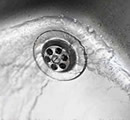Alternate Water Sources
Will any amount of rain solve our water problems? No! Our water probelms are the amount of fresh water available for a growing population. Our needs and uses for water are growing as well. The demand for fresh water has grown exponentially. In addition to conservation efforts, alternate water sources important to meet this demand.
Alternate water sources consist of water sources other than the standard supply of water to the building. The most common sources for household use are rainwater and greywater. Other sources include landscape-scale stormwater harvesting, air conditioner condensate, and more involved systems like wastewater treatment and desalination.
For the household DIY project, greywater and rainwater provide the most practical and economical results for the amount of water delivered. Each has its strengths and weaknesses.
Watch the following introductory video on Alternate Water sources and then view the page links below for more details on each.
Greywater
 Reuse water from laundry, shower, and other household sources.
Reuse water from laundry, shower, and other household sources.
Rainwater Catchment
 Capture and reuse rain water from rain barrels to 5000 gallon tanks.
Capture and reuse rain water from rain barrels to 5000 gallon tanks.
Glossary for Alternate Water Sources
Frequently UNasked Questions
- Is greywater usable for my lawn?
- If I am a totally vegan household, can I use my kitchen sink wastewater as I would greywater?
- Is the effluent waste water from my water treatment system usable as greywater?
- Can I harvest greywater from my tub or shower on a concrete slab?
- Are there code approved pumps to lift, move and carry waste water over a wall or up a hill to a higher part of the yard?
- Do water treatment systems purify water?
- Are all RO, or Reverse osmosis systems the same?
- Did I answer your question?